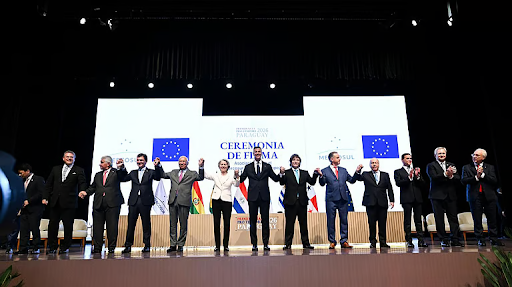



The Fossil Fuel Treaty seeks to complement the Paris Agreement by ending new fossil expansion, phasing out existing production, and supporting a just transition. It targets the widening production gap but faces resistance from major producers. For India, it poses a tough balance between climate goals and coal-dependent development.

Copyright infringement not intended
Picture Courtesy: DOWNTOEARTH
At the COP30 climate summit in Belem, Brazil, Cambodia officially joined a coalition of 17 other nations advocating for a Fossil Fuel Non-Proliferation Treaty.
It is a global initiative calling for an international, legally-binding framework to manage a fair and equitable global transition away from coal, oil, and gas.
It aims to complement the 2015 Paris Agreement, which lacks specific mechanisms to regulate the production and supply of fossil fuels.
Goal: To stop the expansion of new fossil fuel projects, phase out existing production in line with the 1.5°C climate target, and accelerate a just transition to renewable energy.
Growing Support: As of October 2025, it is supported by a bloc of 17 nation-states, also endorsed by the World Health Organization (WHO) and the European Parliament.
The treaty is designed around three interconnected pillars to address the source of the majority of global CO2 emissions.
India has not endorsed the Fossil Fuel Non-Proliferation Treaty, prioritizing its developmental needs, energy security, and climate justice stance.
The Fossil Fuel Non-Proliferation Treaty Initiative offers a logical, science-based approach to the climate crisis. Despite major political and economic challenges, its rising support shows a growing global consensus: a just and equitable fossil fuel phase-out is vital for a livable future.
Source: DOWNTOEARTH
|
PRACTICE QUESTION Consider the following statements about the global support for the Fossil Fuel Non-Proliferation Treaty Initiative: 1. The initiative is endorsed by major fossil fuel-producing nations like the USA and Russia. 2. The European Parliament has endorsed the call for the treaty. 3. India has officially joined the coalition of nations advocating for the treaty. Which of the statements given above is/are correct? A) 1 and 3 only B) 2 only C) 2 and 3 only D) 1, 2 and 3 Answer: B Explanation: Statement 1 is incorrect: The initiative is not endorsed by major fossil fuel-producing nations like the USA and Russia. Statement 2 is correct: The World Health Organization (WHO) and the European Parliament have both formally endorsed the Fossil Fuel Non-Proliferation Treaty Initiative. Statement 3 is incorrect: India has not officially joined the coalition of nations advocating for the treaty. |
It is a proposed international agreement to manage a global transition away from fossil fuels. It aims to complement the Paris Agreement by directly halting new exploration and production of coal, oil, and gas; phasing out existing production equitably; and ensuring a just transition for dependent economies and communities.
The Paris Agreement targets global temperature rise by limiting emissions (demand side) but omits fossil fuel production limits. The Fossil Fuel Treaty addresses this gap by directly restricting coal, oil, and gas production (supply side).
India faces a "Just Transition" dilemma: its high renewable energy goals conflict with its over 70% coal-dependent economy and millions of related jobs. Phasing out coal without significant financial and technological aid risks severe socio-economic disruption in coal-dependent regions.



© 2026 iasgyan. All right reserved